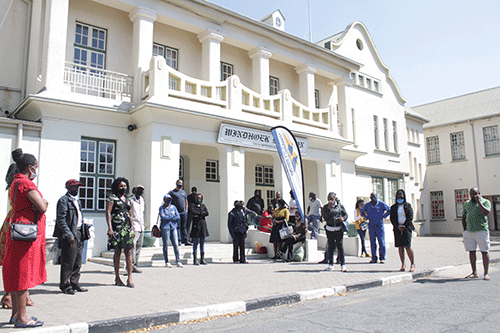Ageing and unreliable rolling stock coupled with a largely dilapidated railway line is forcing would-be train passengers onto the road in a country where fatal road accidents are a common occurrence. “We could not be experiencing lack of transportation if we had passenger trains available to us. Public transport is so expensive compared to taking a train. TransNamib must do something and improve its services to benefit the nation. I am from the north but I have never used a train as a mode of transport,” bemoaned Saima Eelu.
Another frustrated would-be rail passenger is Simon Johannes who also wished train services could be functional.
He argued that had TransNamib passenger service been fully operational, fatal car crashes could be minimised.
“Now we are forced to take buses and they are very risky. Not only that they are risky but also costly because one can fork out as much as N$350 for a hike to the north. We want the train services en route to Oshikango to be operational so we can arrive safely at our destinations. TransNamib must also rehabilitate their railways so no fatalities can occur as we saw a lot of derailments happening now,” he noted.
The company has recorded almost 200 accidents in the last four years, leading to the deaths of 12 people. Last Friday between Guibes and Schakkalskuppe, another TransNamib locomotive and four wagons capsized as a result of a wash away. The personnel involved were not injured.
More than 50% of TransNamib’s railway lines do not meet the minimum Southern African Development Community (SADC) stipulated standard of 18.5 tons/axle load and locomotives are about 60 years old.
TransNamib’s spokesperson Abigail Raubenheimer said passenger services on its own are not economically profitable or viable for TransNamib.
“We only do this as a service to the public and as required through our mandate, but it is important for Namibians to know that it’s not a profitable service on its own and that is why we always combine passenger service with our cargo,” she remarked.
Between April 2020 to 31 March 2021, the number of Starline passengers stood at 5 305.
Secondly, she noted TransNamib’s ageing locomotives, as well as the generally poor state of the railway line, prevent them from running a safe and reliable passenger service in the country.
According to her, the combination of these factors thwarts TransNamib from offering more passenger trains even on other routes.
At the moment, TransNamib’s passenger services have largely stuttered to a halt.
“For example, during December, we ran two trains to and from the south and the west. While there is certainly demand for passenger services, with our ageing and unreliable locomotives which are about 60 years old, we are unable to provide reliable passenger services,” Raubenheimer explained.
This she said will remain the case until such time as and when TransNamib is able to acquire the latest and more reliable locomotives, which are part of the company’s strategic plan.
She mentioned the most popular routes for the passenger services are the Walvis Bay-Windhoek (west) and Windhoek-Keetmanshoop (south) routes.
The current rates the current routes charged are N$180 for the Windhoek - south route, while passengers pay N$170 for the Walvis - Windhoek route.
TransNamib last year leased four locomotives from South Africa. The company has about 25 active locomotives but to operate the business efficiently, they need about 75 locomotives, comprising 50 mainline locomotives and 25 shunting locomotives.
“The leasing of the locomotives forms part of our short to medium-term strategy to increase our pulling capacity. We have done as much as we can and pushed as much as possible with the current ageing rolling stock in order to reach our plan of becoming a profitable company,” she reacted.
She admitted TransNamib needs a rolling stock that is new, reliable, and safe.
–anakale@nepc.com.na


